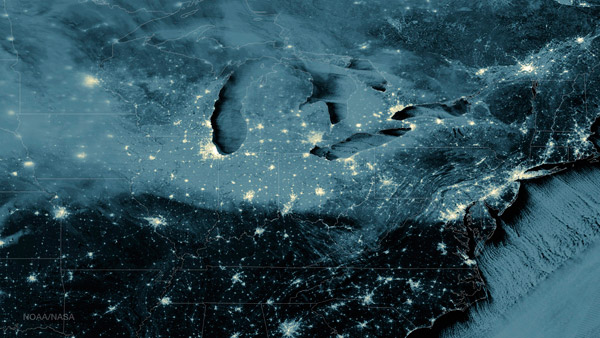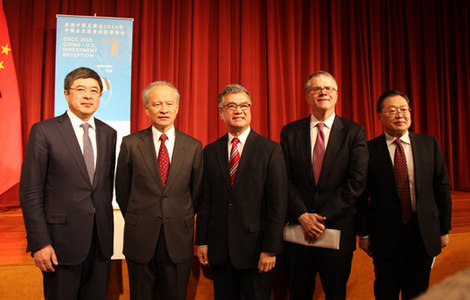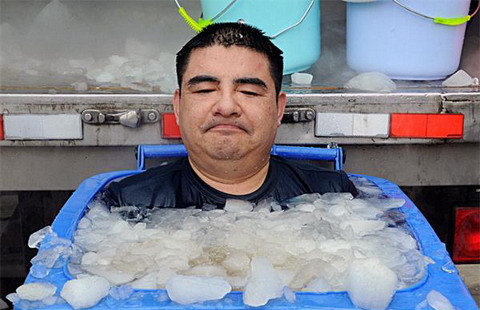China and Canada expect more collaboration on the Arctic
Updated: 2015-03-26 06:03
By Wang Ru(China Daily Canada)
|
||||||||
 |
|
Snow cover and clouds from the Great Lakes to the Mid-Atlantic are seen in an image from NASA's Suomi NPP satellite taken at 02:45 EST (07:45 GMT) January 8, 2015. An Arctic air blast from Canada hit the U.S. Midwest, Mid-Atlantic and Northeast, with many parts around minus 10 Fahrenheit (minus 23 Celsius), the National Weather Service said. [REUTERS/NASA/Handout via Reuters] |
A conversation between Canadian and Chinese Arctic scientists has shown the two countries' willingness of continuing to collaborate on the Arctic region.
During an event last week at the Canadian Embassy in Beijing, Yang Huigen, director-general of the Polar Research Institute of China, said Chinese scientists expect further collaboration with Canada. He also offered the possibility to his Canadian counterpart as China could "build an observatory facility" in Canada's Arctic territory.
David Hik, a professor at the University of Alberta who is on the board of the Canadian Polar Commission and is president of the International Arctic Science Committee, said Canada welcomed China's participation on scientific research in the Arctic.
"I think this is the conversation we need to have, what the interests are, where the possibilities are, where there's expertise in China that could help us understand more about the changes that are taking place in northern Canada. So it's the scientific questions, but it's also how we do it. And I think it's through sharing our expertise and building long-term relationships," said Hik.
Canadian media reported that China is ‘eager to tap Canada's Arctic oil and gas' and the transit of Northwest Passages.
However, in a later report from the Canadian newspaper the Globe and Mail, Chinese scientists' expectation to build an observatory in the remote Arctic hamlet of Tuktoyaktuk, where it is said to be the perfect location, was "warmly welcomed" by the local government of Canada's Northwest Territories (NWT).
In January a delegation of government and industry professionals from Canada's Northwest Territories (NWT) visited China to promote the untapped abundant natural resources and draw investment to the local infrastructure building.
Canada's ambassador to China, Guy Saint-Jacques, said during the event that Canada welcomes enhanced ties with China on Arctic issues.
"Canada is pleased to support the country's application for observer status to the Arctic Council; and we look forward to continued Canada-China cooperation. Already, our various government departments on both sides cooperate on Arctic research, science and technology, meteorology, climate change mitigation, and polar ice monitoring," said the ambassador.
Qin Weijia, director of the Chinese Arctic and Antarctic Administration, added that China hopes to "find areas of common interest and establish a relationship with mutual-benefit with Canada.
Qin introduced that China and Canada "have a good relationship". Chinese scientists joined Canada's Arctic expedition many times and Canadian scientists joined China's second expedition to the Arctic Ocean.
In 2012, Chinese and Canadian scientists also held a seminar called "China in the Arctic" in Ottawa.
Qian Hao, director of the center for Canadian studies at Shanghai International Studies University, said that Canada could enhance its global influence through collaboration with China on the Arctic region.
"Canada played some leadership roles in international issues such as the Ottawa Treaty in 1997, also known as the Anti-Personnel Mine Ban Convention, but in my opinion Canada is seeking more global discourse power," said Qian.
China has no territory claim in the Arctic, however it has been conducting scientific research through its icebreaker expedition and work together with the Arctic countries on issues including climate change and the Arctic ocean marine biodiversity.
China embarked on the first Arctic expedition in 1999 when 124 crew scientists carried out a 71-day expedition to the Arctic Ocean on Xue Long, or Snow Dragon, the first and only vessel of its kind that China bought from Ukraine in 1993.
China built Yellow River Station in Svalbard, Norway, in 2004. China's second icebreaker is reportedly under construction.
As one of eight members, Canada led in the establishment of the Arctic Council in 1996, and was its first chair from 1996 to 1998.
Canada assumed its current and second two-year chairmanship on May 15, 2013. On that same day at the Kiruna Ministerial Meeting in Sweden, China was accredited Arctic Council observer status.
The Arctic Council Ministerial Meeting which will take place on April 24th, 2015, will mark the conclusion of Canada's chairmanship and the beginning of the United States' chairmanship, until 2017.
Canada is establishing a new national institution named Canadian High Arctic Research Station (CHARS) to support polar science and technology, which provides new opportunities for China-Canada collaboration in Arctic science and research.
The mission of CHARS, which is expected to launch in 2017, includes advance knowledge of the Canadian Arctic in order to improve economic opportunities and promote the development and dissemination of knowledge of the other circumpolar regions including the Antarctic.
China has advanced knowledge and participation in the research on the Antarctic. With nearly 30 years' development in polar expeditions, China has built Great Wall Station on King George Island, west Antarctica; Zhongshan Station in the Larsemann Hills, east Antarctica; and Kunlun Station on Dome A, the highest place in Antarctica.
wangru@chinadaily.com.cn

 Your city in the shape of tiny round planet
Your city in the shape of tiny round planet
 Families mourn victims of Airbus A320 crash
Families mourn victims of Airbus A320 crash
 38,000 Brazilian troops to safeguard 2016 Rio Olympics
38,000 Brazilian troops to safeguard 2016 Rio Olympics
 Chinese investors well received
Chinese investors well received
 Top 9 cities in China with highest cost of living
Top 9 cities in China with highest cost of living
 Would you take a challenge for charity?
Would you take a challenge for charity?
 Snow blankets Chicago after spring storm
Snow blankets Chicago after spring storm
 Haze descends on Paris
Haze descends on Paris
Most Viewed
Editor's Picks

|

|

|

|

|

|
Today's Top News
China, US work to clear legal hurdles
Cockpit voice recorder of crashed German plane found
US states reach out to China
Chinese investors well received
US states seek China ties at investment summit
Small US businesses using RMB for transactions: Survey
Iconic Chinese play hits America
Christie's has richest Asia Week
US Weekly

|

|







